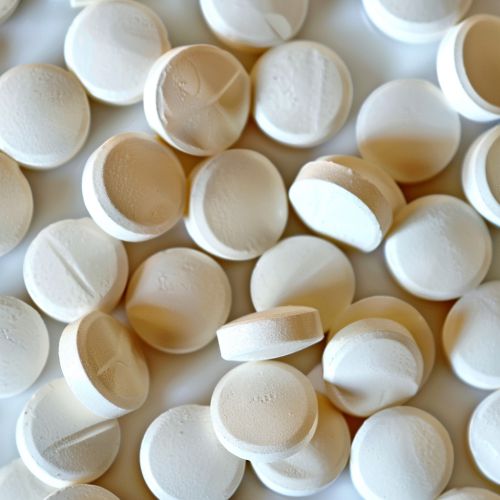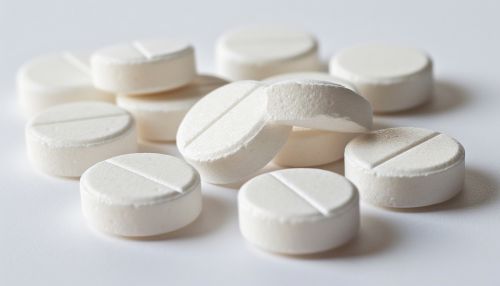Rennie (antacid): Difference between revisions
(Created page with "== Overview == Rennie is a widely used antacid medication that provides relief from symptoms associated with gastroesophageal reflux disease (GERD), heartburn, and indigestion. It is composed primarily of calcium carbonate and magnesium carbonate, which work by neutralizing stomach acid. Rennie is available in various formulations, including chewable tablets and effervescent tablets, making it a convenient option for many individuals. == Composition and...") |
No edit summary |
||
| (One intermediate revision by the same user not shown) | |||
| Line 69: | Line 69: | ||
Rennie is an effective and widely used antacid that provides rapid relief from heartburn and indigestion. Its combination of calcium carbonate and magnesium carbonate offers a dual mechanism of action that neutralizes stomach acid efficiently. While generally safe for most individuals, it is important to use Rennie as directed and be aware of potential side effects and drug interactions. | Rennie is an effective and widely used antacid that provides rapid relief from heartburn and indigestion. Its combination of calcium carbonate and magnesium carbonate offers a dual mechanism of action that neutralizes stomach acid efficiently. While generally safe for most individuals, it is important to use Rennie as directed and be aware of potential side effects and drug interactions. | ||
[[Image:Detail-79305.jpg|thumb|center|Close-up of antacid tablets on a plain background.|class=only_on_mobile]] | |||
[[Image:Detail-79306.jpg|thumb|center|Close-up of antacid tablets on a plain background.|class=only_on_desktop]] | |||
== See Also == | == See Also == | ||
Latest revision as of 00:54, 18 May 2024
Overview
Rennie is a widely used antacid medication that provides relief from symptoms associated with gastroesophageal reflux disease (GERD), heartburn, and indigestion. It is composed primarily of calcium carbonate and magnesium carbonate, which work by neutralizing stomach acid. Rennie is available in various formulations, including chewable tablets and effervescent tablets, making it a convenient option for many individuals.
Composition and Mechanism of Action
Rennie's active ingredients, calcium carbonate (CaCO3) and magnesium carbonate (MgCO3), are both alkaline compounds. When ingested, these compounds react with hydrochloric acid (HCl) in the stomach to form water, carbon dioxide, and corresponding salts. This neutralization reaction increases the pH of the stomach contents, thereby reducing acidity and alleviating symptoms of heartburn and indigestion.
The chemical reactions can be summarized as follows: \[ \text{CaCO}_3 + 2\text{HCl} \rightarrow \text{CaCl}_2 + \text{H}_2\text{O} + \text{CO}_2 \] \[ \text{MgCO}_3 + 2\text{HCl} \rightarrow \text{MgCl}_2 + \text{H}_2\text{O} + \text{CO}_2 \]
Pharmacokinetics
Upon ingestion, Rennie’s active ingredients dissolve in the stomach acid. The resultant calcium and magnesium ions are absorbed in the small intestine. Calcium absorption is dependent on vitamin D levels and can be influenced by dietary factors. Magnesium absorption occurs primarily in the ileum and is regulated by the kidneys. Excessive intake of calcium and magnesium can lead to hypercalcemia and hypermagnesemia, respectively, though such occurrences are rare with standard dosages.
Clinical Uses
Rennie is primarily indicated for the relief of:
- Heartburn
- Acid indigestion
- Sour stomach
- Upset stomach associated with these symptoms
It is also used off-label for the treatment of symptoms associated with peptic ulcer disease and gastritis. Rennie’s rapid onset of action makes it suitable for acute symptom relief.
Dosage and Administration
Rennie is typically administered as needed, with the recommended dosage being 1-2 tablets chewed or dissolved in the mouth, up to a maximum of 11 tablets per day. For effervescent tablets, the usual dose is 1-2 tablets dissolved in water, taken as required. It is important to follow the dosage instructions provided by a healthcare professional to avoid potential side effects.
Side Effects and Precautions
Common side effects of Rennie include:
- Constipation
- Diarrhea
- Flatulence
Less common but more serious side effects can include:
- Hypercalcemia
- Hypermagnesemia
- Milk-alkali syndrome
Patients with pre-existing conditions such as kidney disease, hypercalcemia, or those on a low-phosphate diet should use Rennie with caution. It is also important to consider potential drug interactions, particularly with medications that affect calcium and magnesium levels.
Contraindications
Rennie is contraindicated in individuals with:
- Severe renal impairment
- Hypercalcemia
- Hypophosphatemia
- Known hypersensitivity to any of its ingredients
Drug Interactions
Rennie can interact with various medications, including:
- Tetracyclines and quinolones (antibiotics)
- Bisphosphonates (used to treat osteoporosis)
- Levothyroxine (thyroid hormone replacement)
- Iron supplements
These interactions can affect the absorption and efficacy of the concomitant medications. It is advisable to take Rennie at least 2 hours before or after other medications to minimize interaction risks.
Special Populations
Pregnancy and Lactation
Rennie is generally considered safe for use during pregnancy and lactation. However, it is recommended to consult a healthcare provider before use to ensure it is appropriate for the individual’s specific condition.
Pediatric Use
Rennie is not typically recommended for children under the age of 12 unless prescribed by a healthcare professional. The safety and efficacy in this age group have not been well established.
Overdose
Overdose of Rennie can lead to symptoms of hypercalcemia and hypermagnesemia, including nausea, vomiting, confusion, and cardiac arrhythmias. In severe cases, it may result in renal failure. Immediate medical attention is required in the event of an overdose.
Storage
Rennie should be stored at room temperature, away from moisture and heat. It should be kept out of reach of children to prevent accidental ingestion.
Conclusion
Rennie is an effective and widely used antacid that provides rapid relief from heartburn and indigestion. Its combination of calcium carbonate and magnesium carbonate offers a dual mechanism of action that neutralizes stomach acid efficiently. While generally safe for most individuals, it is important to use Rennie as directed and be aware of potential side effects and drug interactions.


